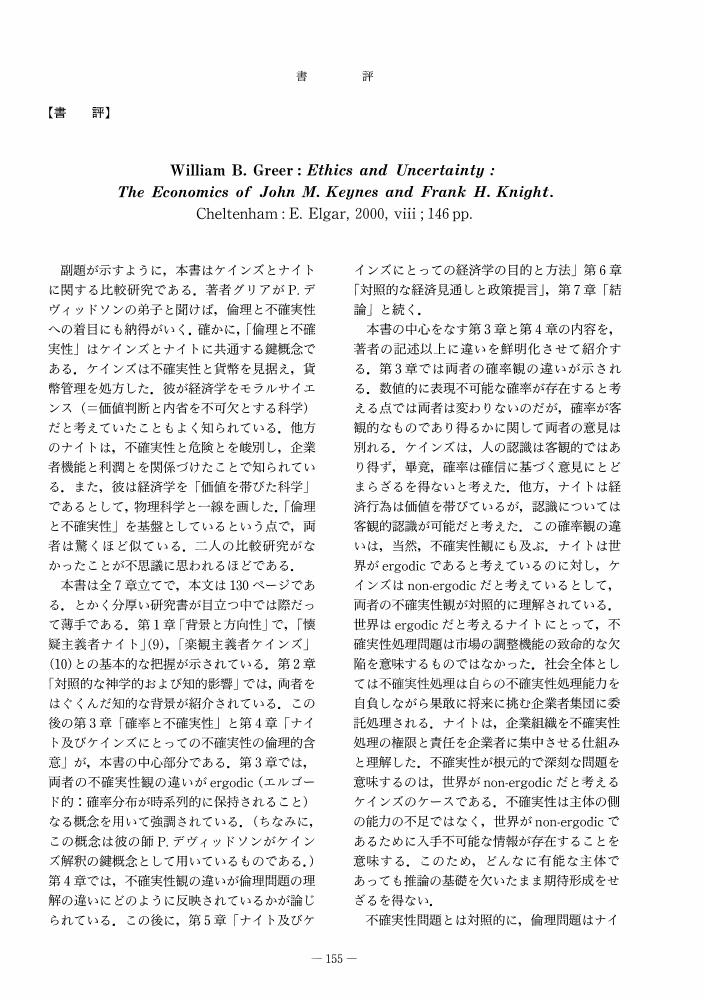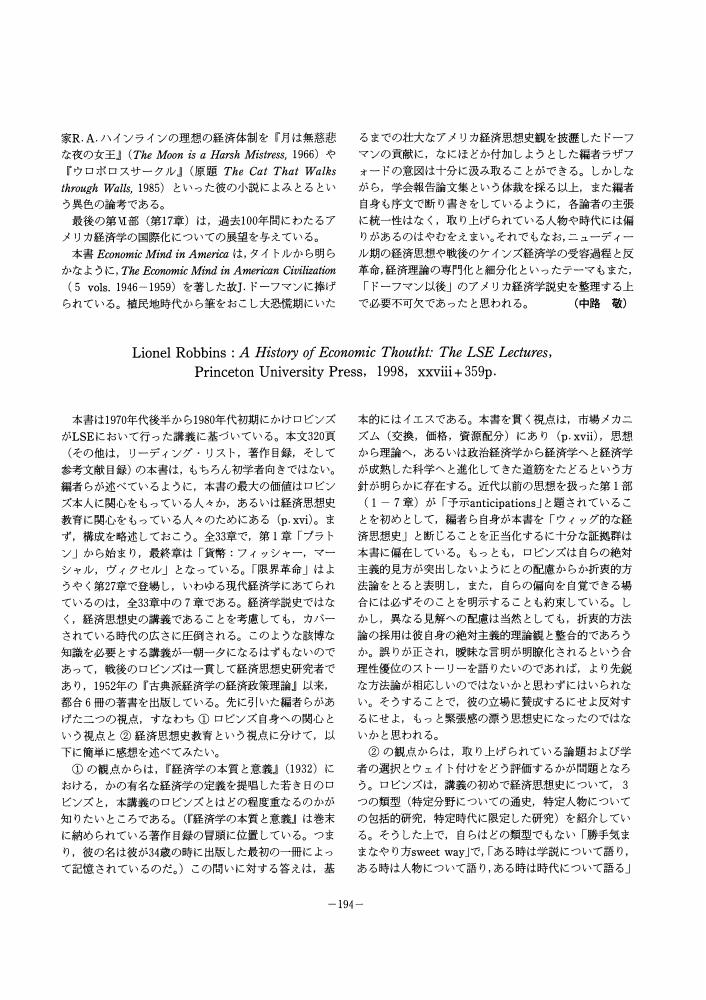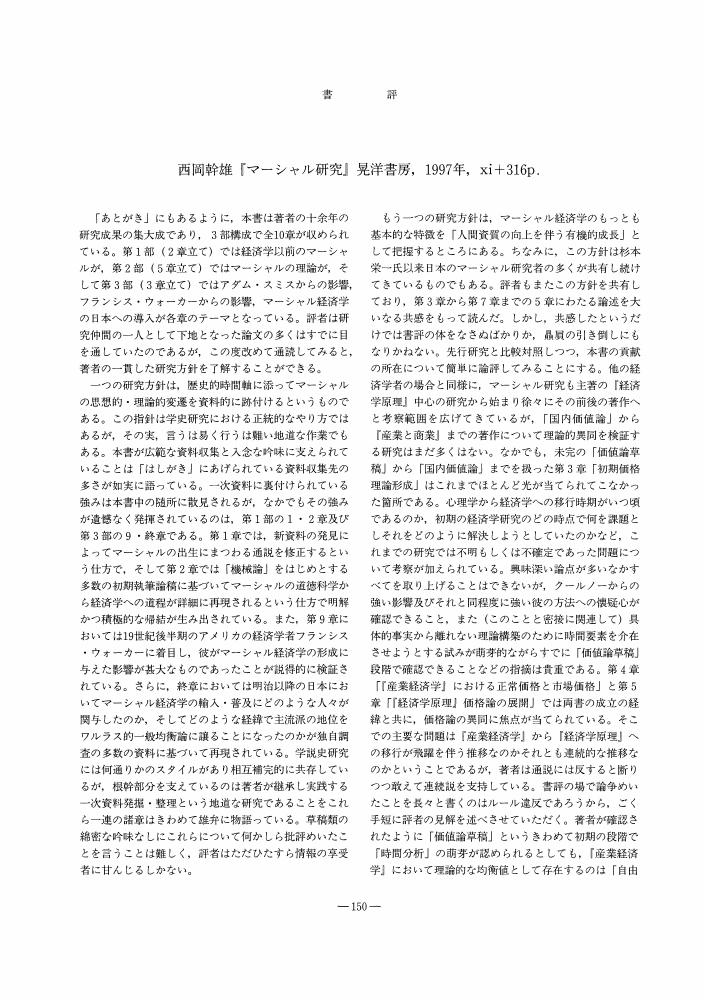1 0 0 0 OA 故佐藤昭夫先生の研究成果から見た自律神経と鍼灸
- 著者
- 佐藤 優子 内田 さえ 野口 栄太郎 今井 賢治 小俣 浩
- 出版者
- 社団法人 全日本鍼灸学会
- 雑誌
- 全日本鍼灸学会雑誌 (ISSN:02859955)
- 巻号頁・発行日
- vol.60, no.4, pp.672-692, 2010 (Released:2011-01-20)
- 参考文献数
- 49
1 0 0 0 OA マーシャルの生産知識論
- 著者
- 藤井 賢治
- 出版者
- The Japanese Society for the History of Economic Thought
- 雑誌
- 経済学史学会年報 (ISSN:04534786)
- 巻号頁・発行日
- vol.43, no.43, pp.11-23, 2003 (Released:2010-08-05)
- 参考文献数
- 24
In this paper, we try to reinterpret Marshall's External Economies with the key con cept of “the knowledge on production methods.” In Section 2, through reexamining the criticism directed against Marshall's treatment of increasing returns, we outline the reason why we seek the possibility of “external economies at an industry level.” The consequence of the Cambridge Cost Controversy was quite legitimate as far as the adoption of the equilibrium method was premised. Marshall's representative firm cannot be supported when assessed strictly since it is a static concept that contains several dynamic forces in it. Surely, we need to adopt a dynamic method for dynamic phenomena, which Allen Young once maintained forcibly. But we differ from Young in that we consider a partial method to be useful in spite of the fact that he contended the analysis of increasing returns to be conducted in inter-industrial context.In Section 3, the function of the organization of a firm is discussed from the standpoint of “the knowledge on production methods, ” which is the type of applicable knowledge that cannot be discovered and learned from basic principles nor restored as explicit knowledge. The characteristic of the knowledge on production methods is that both improving and learning take place only gradually through a trial-and-error process. So, time and stable environments are necessary for this type of knowledge to be utilized effectively. We show that internal economies can be interpreted as the economies of specialization and integration of production knowledge at a firm level.In Section 4, we proceed to the reinterpretation of Marshall's external economies. What various firms in an industry face is the situation where the knowledge on the production methods is not in a complete form and is much diversified among them. Thus, an industry can be regarded as a place of competition over alternative production methods. Firms in an industry strive to improve their own knowledge while paying attention to the movements of other firms. Firms in the same industry can be viewed to comprise a kind of knowledge community where the knowledge on the production methods spreads and is shared. Although firms in the same industry are in a competitive relation, but are on the same vessel in another viewpoint. For, any progress in production methods carried out by one firm is a threat to others in the same industry in the short run, but contributes to the industry as a whole in the long run. The shared knowledge can contribute to unintended cooperation among firms that adopts the same production knowledge just as a commonly shared language does. Thus, standardization helps to economize coordination costs between firms in the same industry. The main contention of this paper is that Marshall's external economies can be reinterpreted as the economies available through the standardization of knowledge on production methods that takes place mainly at the industry level. Being reinterpreted in this way, Marshall's concept of external economies has a sufficient economic basis.
- 著者
- 藤井 賢治
- 出版者
- The Japanese Society for the History of Economic Thought
- 雑誌
- 経済学史学会年報 (ISSN:04534786)
- 巻号頁・発行日
- vol.42, no.42, pp.155-156, 2002 (Released:2010-08-05)
- 著者
- 藤井 賢治
- 出版者
- The Japanese Society for the History of Economic Thought
- 雑誌
- 経済学史学会年報 (ISSN:04534786)
- 巻号頁・発行日
- vol.37, no.37, pp.194-195, 1999 (Released:2010-08-05)
1 0 0 0 OA 西岡幹雄『マーシャル研究』晃洋書房, 1997年, xi+316p.
- 著者
- 藤井 賢治 西岡 幹雄
- 出版者
- 経済学史学会
- 雑誌
- 経済学史学会年報 (ISSN:04534786)
- 巻号頁・発行日
- vol.36, no.36, pp.150-152, 1998 (Released:2010-08-05)
- 著者
- 藤井 賢治
- 出版者
- The Japanese Society for the History of Economic Thought
- 雑誌
- 経済学史学会年報 (ISSN:04534786)
- 巻号頁・発行日
- vol.35, no.35, pp.177-178, 1997 (Released:2010-08-05)
1 0 0 0 OA マーシャル『産業と商業』の動態論
- 著者
- 藤井 賢治
- 出版者
- The Japanese Society for the History of Economic Thought
- 雑誌
- 経済学史学会年報 (ISSN:04534786)
- 巻号頁・発行日
- vol.34, no.34, pp.77-88, 1996 (Released:2010-08-05)
- 参考文献数
- 27
The economics of Marshall has long been assessed mainly on The Principles of Economics; besides, the assessment centered on the partial-equilibrium aspect of it. Although Marshall himself recommended and pursued a biological economics, his attempt has been evaluated as merely a promise. This paper examines Industry and Trade, which has practically been ignored as far as its theoretical aspect is concerned. One can find ‘standardization’ plays the key role in the historical accounts of that book. ‘Standardization’ which means more common knowledge possessed by members of an organization, is caused by habitual behaviours of agents or institutional arrangements agreed upon and promotes the development of that organization, thereby increasing the productivity of it. ‘Standardization’ captures an interaction of men and environments in an economic sense and provides Marshallian economics with the dynamics necessary for organizational growth.
1 0 0 0 OA 『一般理論』形成史研究の現在
- 著者
- 藤井 賢治
- 出版者
- The Japanese Society for the History of Economic Thought
- 雑誌
- 経済学史学会年報 (ISSN:04534786)
- 巻号頁・発行日
- vol.32, no.32, pp.121-126, 1994 (Released:2010-08-05)
- 参考文献数
- 27
1 0 0 0 OA マーシャルにおける組織と分配
- 著者
- 藤井 賢治
- 出版者
- The Japanese Society for the History of Economic Thought
- 雑誌
- 経済学史学会年報 (ISSN:04534786)
- 巻号頁・発行日
- vol.31, no.31, pp.58-66, 1993 (Released:2010-08-05)
- 参考文献数
- 12
The importance of Organization in Marshall's economics has gradually come to be recognized. This paper carries further this line of thought as to develop an implication for his theory of distribution.Factors of production employed within different organizations (firms or industries) can never be expected to earn the equal rates of reward in Marshall's system. Thus, the notion of ‘capital in general’ or that of ‘labor in general’ is without substance except in a special case. No normal rate of profit nor of wage is determined in a market, but is defined only in relation to the representative firm. The role of ‘free capital’ which had best be interpreted as capital outside an organization is to determine the rate of interest as a market price for using capital and to apply it to existing capital within different organizations to estimate the amount of net interest which must be paid out of whatever profits firms realized.There is no confusion between the rate of interest and the rate of profit as sometimes claimed. The real problem lies in the confusion between the money rate of interest and the real rate of interest arising from the ambiguous character of ‘free capital’.
- 著者
- 藤井 賢治
- 出版者
- The Japanese Society for the History of Economic Thought
- 雑誌
- 経済学史学会年報 (ISSN:04534786)
- 巻号頁・発行日
- vol.30, no.30, pp.103, 1992 (Released:2010-08-05)
- 著者
- 藤井 賢治
- 出版者
- The Japanese Society for the History of Economic Thought
- 雑誌
- 経済学史学会年報 (ISSN:04534786)
- 巻号頁・発行日
- vol.28, no.28, pp.43-44, 1990 (Released:2010-08-05)
1 0 0 0 OA 当院における壊死性軟部組織感染症の臨床的特徴の検討
- 著者
- 高橋 哲也 藤澤 美智子 土井 賢治 永田 功 中山 祐介 武居 哲洋
- 出版者
- 一般社団法人 日本臨床救急医学会
- 雑誌
- 日本臨床救急医学会雑誌 (ISSN:13450581)
- 巻号頁・発行日
- vol.22, no.3, pp.475-480, 2019-06-30 (Released:2019-06-30)
- 参考文献数
- 18
目的:当院で手術対象となった壊死性軟部組織感染症の臨床的特徴を検討すること。 対象:2006年4月1日〜2018年9月30日に軟部組織感染症で手術を施行した症例のうち組織に壊死性変化を認めた症例を対象とし,その特徴を後方視的に検討した。なお初回手術は壊死組織の完全除去を目的としたdebridementではなく感染部位を切開洗浄する方法を行っている。結果:33例が対象となり,来院から切開までの時間は1時間以内が18例(54.5%)と最多であった。切開後の創部は20例で自然閉鎖または縫合で軽快し,植皮術は10例,肢切断は3例に施行された。入院死亡は8例(24.2%)であった。体幹部感染は死亡症例の全例で認められ,ロジスティック回帰分析で死亡の独立危険因子であった(オッズ比29.0,95%信頼区間1.09-771,p<0.05)。結論:壊死性軟部組織感染症に対する初回にdebridementを施行しない切開法は,来院後きわめて迅速に施行されていた。死亡率は24.2%で,体幹部感染が死亡の独立危険因子であった。
1 0 0 0 OA Kaggle Kuzushiji Recognition(くずし字認識) 手法概要
- 著者
- 土井 賢治
1 0 0 0 OA 顎関節症IIIa型に鍼治療を試みた1症例
- 著者
- 皆川 陽一 伊藤 和憲 今井 賢治 大藪 秀昭 北小路 博司
- 出版者
- 社団法人 全日本鍼灸学会
- 雑誌
- 全日本鍼灸学会雑誌 (ISSN:02859955)
- 巻号頁・発行日
- vol.60, no.5, pp.837-845, 2010 (Released:2011-05-25)
- 参考文献数
- 18
【目的】鍼治療は、 顎関節症の保存療法としてよく用いられているが、 その多くが咀嚼筋障害を主徴候としたI型の報告である。 そこで今回、 関節円板の異常を主徴候としたIIIa型患者に対して鍼治療を行い、 症状の改善が認められた1症例を報告する。 【症例】19歳、 女性。 主訴:開口障害、 開口・咀嚼時痛。 現病歴:X-1年、 左顎に違和感が出現した。 X年、 口が開きにくくなると同時に開口・咀嚼時の顎の痛みが出現したため歯科を受診した。 診察の結果、 MRI所見などから顎関節症IIIa型と診断され鍼治療を開始した。 【方法】鍼治療は、 関節円板の整位と鎮痛を目的に外側翼突筋を基本とした鍼治療を週1回行った。 効果判定は、 主観的な顎の痛み・不安感・満足感をVisual Analogue Scale(VAS)で、 開口障害を偏位の有無で、 円板・下顎頭の位置や形態の確認をMRIにて評価した。 【結果】初診時、 顎の痛みを示すVASは52mmであり鍼治療を行ったところ、 2診目治療前には痛みの軽減がみられた。 4診目に一時的な症状の悪化が認められたが、 その後も治療を継続することで顎の痛みを示すVASが2mmまで改善した。 一方、 治療8回終了後のMRI撮影では関節円板の転位に著変はないものの運動制限と開口障害の改善がみられた。 【考察】顎関節症IIIa型に対する鍼治療は関節円板の整位はみられないものの転位した関節円板に随伴する症状を改善させる効果を有することが示唆された。
- 著者
- 緒方 さつき 森松 嘉孝 幸崎 弥之助 工藤 昌尚 田尻 守拡 井 賢治 渡邉 健次郎
- 出版者
- 一般社団法人 日本救急医学会
- 雑誌
- 日本救急医学会雑誌 (ISSN:0915924X)
- 巻号頁・発行日
- vol.17, no.3, pp.99-103, 2006
症例は42歳の男性。400ccの自動二輪車運転中に左側の駐車場から無灯火で出てきた普通車の右側面に衝突し,当院へ搬送された。来院時,呼吸は腹式呼吸で,両上下肢の知覚が消失し,両上下肢で徒手筋力テスト0であった。病的反射の出現は認めなかったが,肛門反射が完全に消失していた。重症の下位頸髄損傷を疑うも,頸椎単純X線,頭部CT,頸髄・胸髄・腰髄MRI検査にて異常所見は認めなかった。その後,6年前の急性一過性精神病性障害の既往が判明し,転換性障害の診断にて入院となった。徐々に症状の改善がみられ,リハビリテーション目的にて第13病日に他院へ転院となった。救急の現場において,症状と検査所見が一致しない事例をみた場合,精神病性障害である可能性に留意すべきである。
- 著者
- 土井 賢治
- 出版者
- 情報処理学会 ; 1960-
- 雑誌
- 情報処理 (ISSN:04478053)
- 巻号頁・発行日
- vol.59, no.11, pp.971-973, 2018-10-15
深層学習の画像識別分野への適用事例として,ラーメン二郎の画像から提供店舗を識別するモデルを作成した際の具体的な作業項目や勘所を紹介する.学習データの収集および分類工程においては, クローラーで収集した画像に対するクレンジング処理について重点的に解説する.モデルの学習においては, モデルの識別精度向上につながる各種手法(ファインチューニング, データ拡張,モデルアンサンブル)について重点的に解説する.学習したモデルの評価においては, モデルの各種評価指標の解説および, 作成したモデルの具体的な識別精度を提示する.
- 著者
- 木村 研一 矢野 忠 山田 伸之 今井 賢治 廣 正基 渡辺 一平
- 出版者
- 社団法人 全日本鍼灸学会
- 雑誌
- 全日本鍼灸学会雑誌 (ISSN:02859955)
- 巻号頁・発行日
- vol.48, no.3, pp.279-291, 1998-09-01 (Released:2011-03-18)
- 参考文献数
- 46
皮膚交感神経機能に及ぼす鍼刺激の効果を検討するためにSSR (sympathetic skin response) 、SFR (sympathetic flow response) 及び手掌部の精神性発汗量を指標に検討すると同時に各指標間の関連性についても併せて検討した。被験者は健康成人男性10名、平均年齢24.7±3.1歳 (mean±SD) とした。実験は無刺激対照群 (以降、対照群) と鍼刺激群を設定し、同一被験者を対象とした。SSRは記録電極を左手掌部中央に、基準電極を同側中指爪上部に貼付し、SFRはレーザードップラー血流計のプローブを左示指指腹に装着した。精神性発汗波はハイドログラフを用い、右手掌部に1cm2のカプセルを装着した。各指標は同時測定し、電気刺激は前額部正中線上に刺激間隔および刺激強度をランダムに変更して行い、各反応を誘発し。記録した。尚、対照群は安静負荷前後、鍼刺激群は鍼刺激前後で測定を行った。鍼刺激は右側の合谷穴にステンレス鍼 (セイリン化成) を刺入し、鍼響を得た後1Hzの雀啄刺激を1分間行った後に、10分置鍼した。結果は以下の通りであった。 (1) SSR、SFR及び手掌部の精神性発汗波はHabituationを起こすことなく記録できたが、各々の相関関係は小さかった。 (2) SSR及び精神性発汗量は鍼刺激後有意に抑制されたが、SFRは無刺激及び鍼刺激の両方で抑制された。以上のことから鍼刺激は皮膚交感神経機能を抑制する作用があることが示唆された。
1 0 0 0 OA ケンブリッジ、オクスフォード、LSEの経済思想と現代福祉国家の変容
19世紀末以降のケンブリッジ、オクスフォード、LSEの経済思想の展開を、現代福祉国家の変容・危機を視野に入れて、共同研究を進め成果を得た。具体的には、1. 「創設期の厚生経済学と福祉国家」から厚生経済学史の再検討へ、2. リベラリズムの変容と福祉国家-ニュー・リベラリズムからネオ・リベラリズムへ、3. マーシャル、ケインズと同時代の経済思想、4. ケインズと現在の世界経済危機-戦間期との比較考証、の4点を中心に国際共同研究を進め成果を得た。







